Table of Contents
8 Best Non-Toxic Dish Soaps for a Greener Kitchen
This page may contain affiliate links. We may earn a commission on purchases, at no additional cost to you. Learn more →
Let’s be honest—washing dishes isn’t exactly the highlight of anyone’s day. And if you’re like us, you probably noticed that after a good scrub, your hands are so dry and irritated they need a whole bottle of lotion!
Well, we got fed up and started looking into what was in our dish soap.
We started down the road of trial and error, countless hours of research, and more than a few kitchen sink experiments to find the best non-toxic dish soaps the market had to offer.
What did we discover? You're not gonna like this. But here's the truth: The harsh chemicals in conventional dish soaps were not only tough on our hands but also filled with ingredients linked to skin and lung irritation, even endocrine disruption. We didn’t want anywhere near our home. That’s when we knew it was time for a change.
Finding a non toxic dish soap that worked became part of our larger commitment to non-toxic living, along with our switches to non toxic laundry detergent (also DYI options), cleaning products, and toxin free air fresheners - to name a few!
If you're ready to make the switch to natural dish soap, we've gathered everything we learned along the way to help you find the perfect non-toxic dish soap for your kitchen. Let's do it!
Why Switch to Non Toxic Dish Soaps?
After learning about all the harsh chemicals lurking in conventional dish soaps, it’s no wonder we were ready for a change. But beyond just wanting to protect our hands, there’s so much more that makes switching to non-toxic dish soaps totally worth it.
List the benefits to using the non toxic verison:
-
Your Skin Deserves Better: Non-toxic formulas keep your hands soft and irritation-free, even after scrubbing tough messes.
-
Cleaner Conscience: Made with biodegradable ingredients, these soaps are kinder to the planet and reduce your environmental impact.
-
Squeaky Clean: No harmful residues left behind—just genuinely clean dishes that are safe for your family.
-
Natural Scents, No Surprises: Enjoy fresh, natural fragrances of essential oils without synthetic chemicals, making dishwashing a bit more enjoyable.
Switching to non-toxic dish soaps is a simple yet impactful way to care for your home, your health, and the environment.
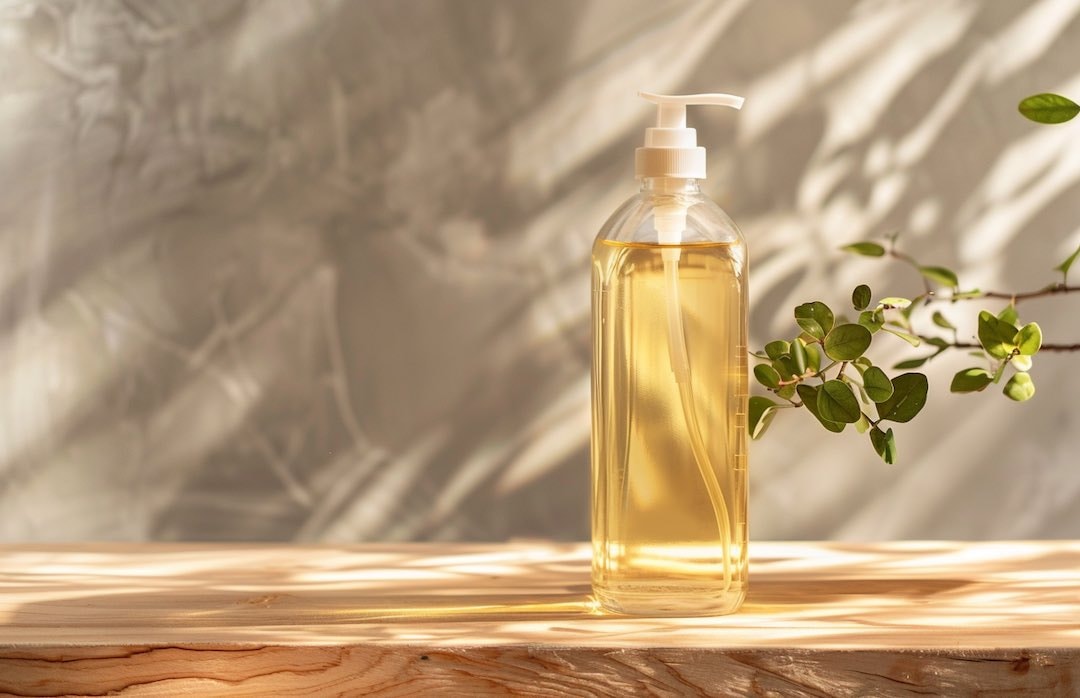
The Best Non Toxic Dish Soaps Brands
"Best"
Meliora | Shop here*
Sonett | Shop here*
Dr. Bronners | Shop here*
Attitude | Shop here*
Branch Basics | Shop here*
"Better"
Molly's Suds | Shop here*
Nellie's | Shop here*
Public Goods | Shop here*
How Do We Choose the Best Natural Dish Soaps?
Scrubbing plates until every last bit of food is gone and achieving that squeaky-clean finish—We can't be the only ones who find that to be a special kind of satisfying! All that elbow grease energy we put into washing dishes is all the more reason to choose products that are both safe and effective.
"Best" vs "Better"
We've divided our favorites into two groups:
The "Best" are our absolute top picks. These dish soaps are the cream of the crop. They're packed with the purest, most effective natural ingredients, so you can scrub those dishes with peace of mind, knowing you're keeping your home free from harmful chemicals.
The "Better" are still fantastic, but with just one or two things we think could be better. They might contain a few ingredients that aren't quite as gentle, especially for those with sensitive skin or for families with little ones.
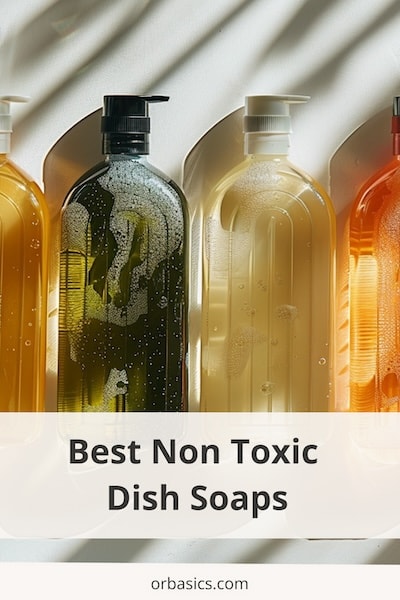
What Are the Best Non Toxic Dish Soaps?
Meliora Dish Soap Puck* (Our Top Pick)
Bar
Best Overall
Pricing: $15.99
Certifications: MadeSafe, B Corp, Women Owned, 1% for the Planet, Leaping Bunny
Key Toxin Free Ingredients: Sodium cocoate, Sunflower seed oil, Organic coconut oil
Why We Like It: We’re all about keeping our homes safe, and this dish soap bar is a total standout in our kitchen. It's what we get the most comments about when people come to visit! It’s a grease-busting beast—scrubbing tough stuck-on sauce or soaking our pans is just as effective as the leading conventional dish soap we used before but without all the nasty chemicals. Plus, it’s super kind to sensitive skin, which is a big win for our hands. Meliora’s eco-friendly vibes are strong with their plastic-free packaging and promise to give back 2% of their annual revenue to environmental causes. We actually find the soap puck to be pretty large in size, so we chop it into three easy-to-use pieces.
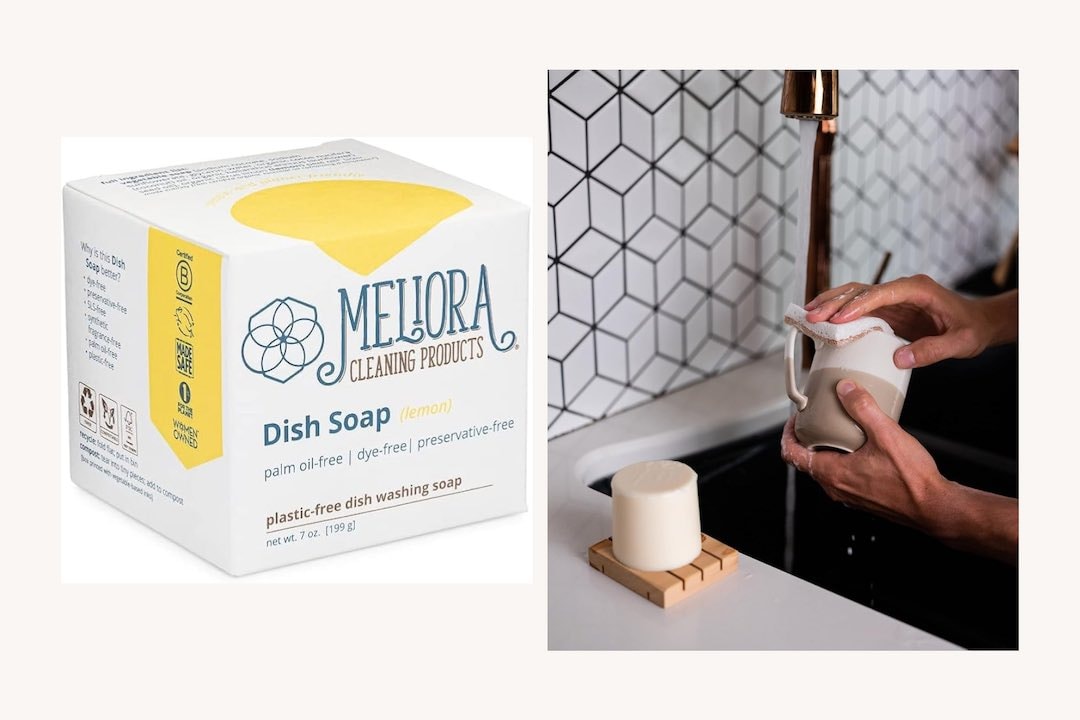
Image @ Meliora
Sonett Dishwashing Liquid*
Liquid
Best Naturally Scented
Pricing: $14.99
Certifications: Ecogarantie, CSE, Vegan Society, NCP, NCS
Key Non Toxic Ingredients: Organic lemongrass oil, Natural sweet orange essential oil, Sodium citrate
Why We Like It: We didn’t know liquid dish soaps could be this good until we tried Sonett's dishwashing liquid. With just a couple of squirts, it tackles everything an Italian dinner could muster - from stubborn cutting board stains to lingering garlic smells, all while being super gentle on our hands. The fresh orange scent is one we adore. It makes dishwashing a bit more enjoyable if you can believe it!
Sonett is a pioneer in ecological laundry detergents and cleaning agents. The company sources biodegradable, predominantly organic ingredients from biodynamic cultivation where possible. We love that Sonett is so serious about sustainability, from cutting down plastic waste to reducing emissions. It’s a soap that works hard and aligns with our values.
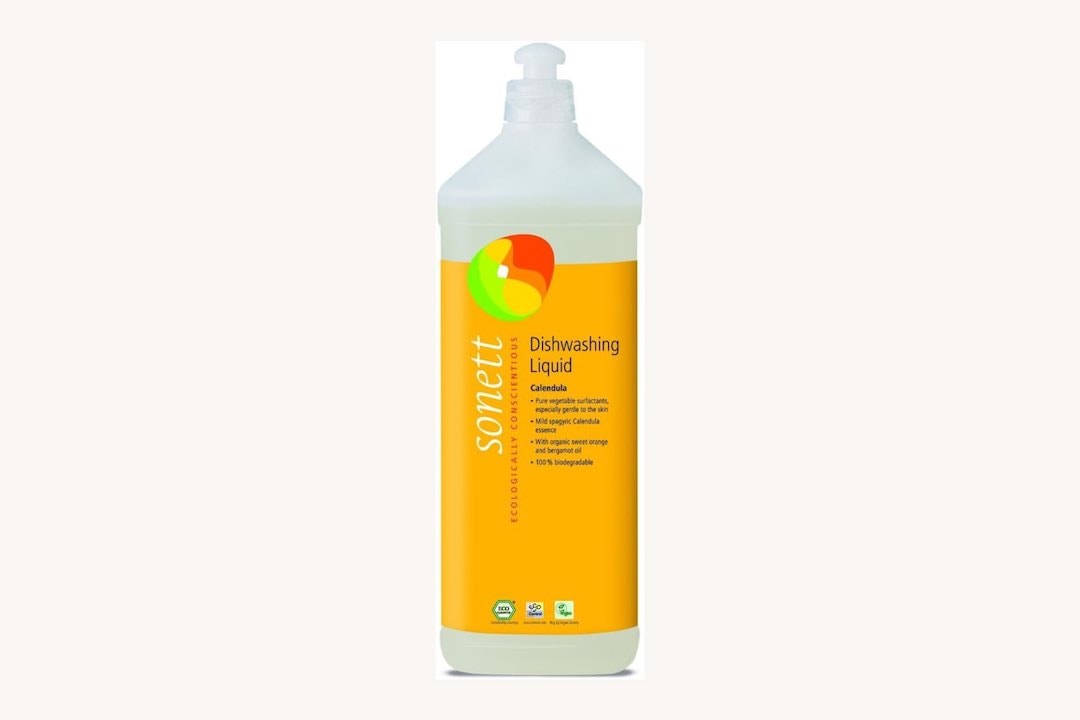
Image @ Sonett
Dr. Bronners - Pure Castile Liquid Soap*
Liquid Dish Soap Concentrate
Best Multi-Purpose Dish Soap
Pricing: $32.99
Certifications: Fair Trade, EWG, Leaping Bunny, Non-GMO, Vegan, OTCO
Key Non Toxic Ingredients: Organic hemp seed oil, Organic coconut oil, Organic olive oil
Why We Like It: This organic dish soap is like the Swiss Army knife of soaps—there’s practically nothing it can’t do. We’ve used it for everything from washing dishes and cleaning houseplants to clarifying our hair and scrubbing down after a day in the garden. It’s an unscented dish soap, which is perfect for those of us who like to keep things simple and natural. Plus, the fact that a little goes a long way means it’s worth every penny. We're also obsessed with their 100% post-consumer recycled bottles and eco-friendly refill cartons. It’s a win-win for our homes and the planet.
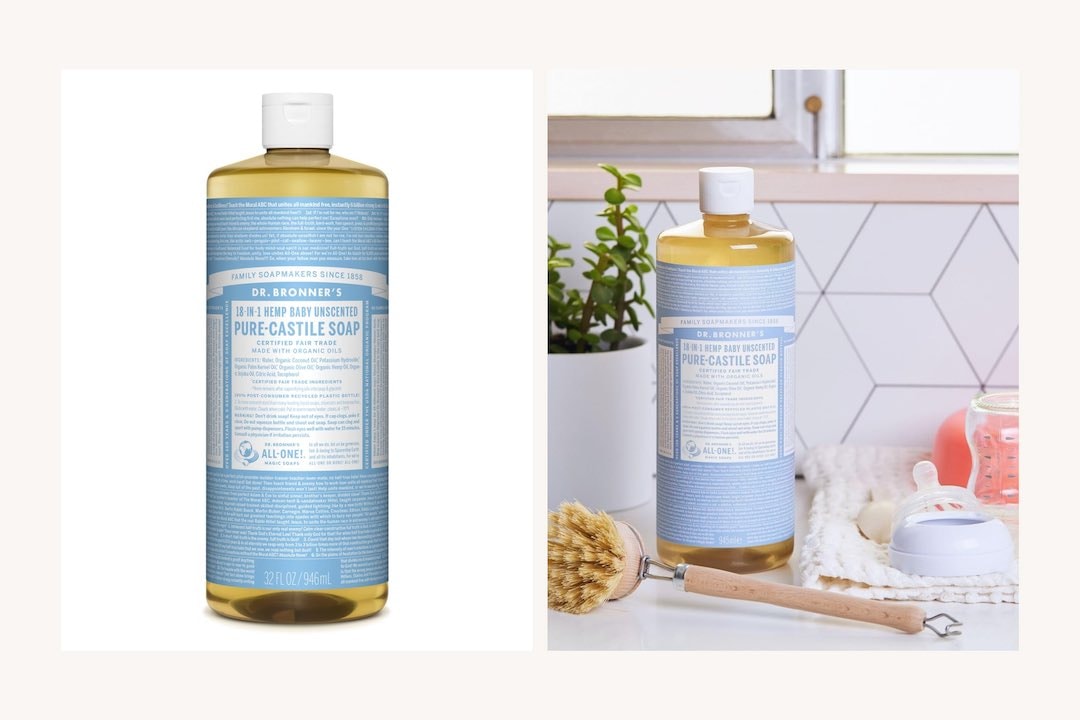
Image @ Dr. Bronner's
Attitude Dishwashing Liquid*
Liquid
Best Fragrance-Free Dish Soap
Pricing: $7.19
Certifications: EWG, ECOLOGO, Certified by PETA, FSC
Key Nontoxic Ingredients: Sodium coco-sulfate, Camellia Sinensis leaf extract, Sodium chloride
Why We Like It: This dish soap’s got a prime spot by our sink, and for good reason. It’s fragrance-free, which is awesome for keeping things fresh without any weird after-smells. We’re really impressed with how it slices through grease like a pro, even when we’re elbow-deep in a pile of dishes with no dishwasher in sight. Plus, knowing it’s packed with safe, non-toxic ingredients means we’re cool using it on everything, from baby bottles to greasy pans. And props to the brand for being eco-warriors—they’ve planted over 1.5 million trees and ditched over 1000 tons of plastic with their planet-friendly packaging. Safe, sustainable, and seriously solid.
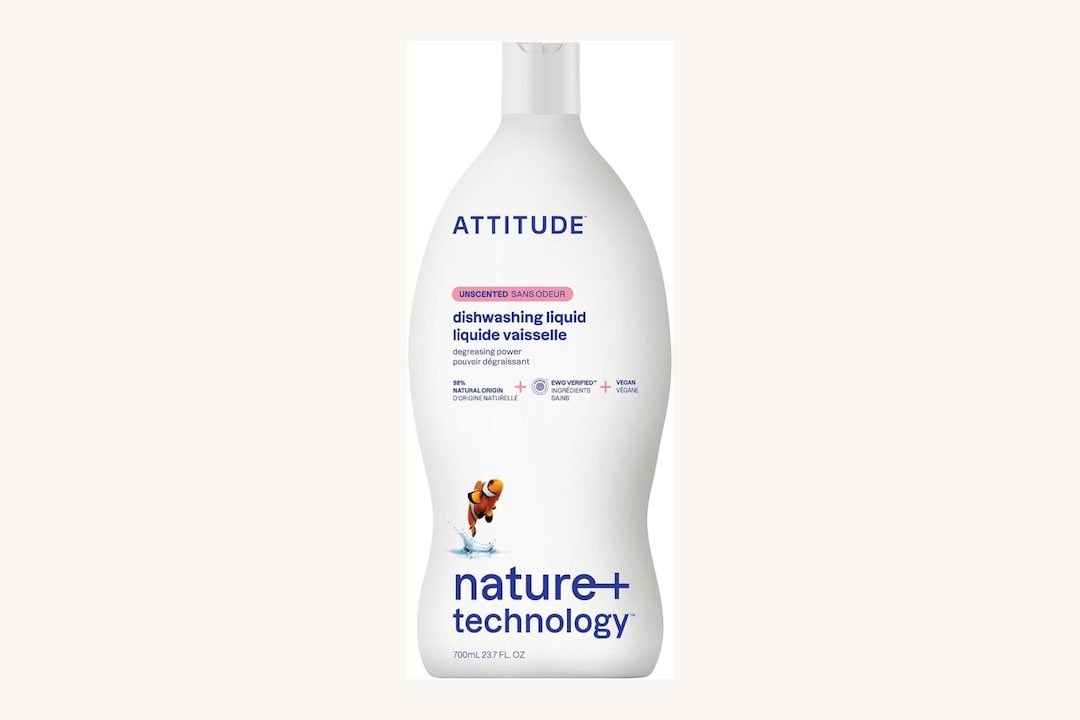
Image @ ATTITUDE
Branch Basics*
Liquid Concentrate
Best Concentrate
Pricing: $55
Certifications: EWG, Leaping Bunny, MadeSafe
Key Non-Toxic Ingredients: Sodium carbonate, Sodium citrate, Decyl glucoside
Why We Like It: Branch Basics Concentrate is a powerhouse of versatility. This concentrate isn’t just for dishes—it’s an all-in-one cleaner that can be diluted for various uses around the home, including dishwashing. We love how it’s free from harmful chemicals and tough on grease while being gentle on our hands and the environment. The fact that it’s super concentrated means a little goes a long way, making it both eco-friendly and budget-friendly. Plus, it’s perfect for those with sensitivities, offering a safe and effective way to keep your kitchen and home spotless. Clean dishes, happy home, and a big win for us!
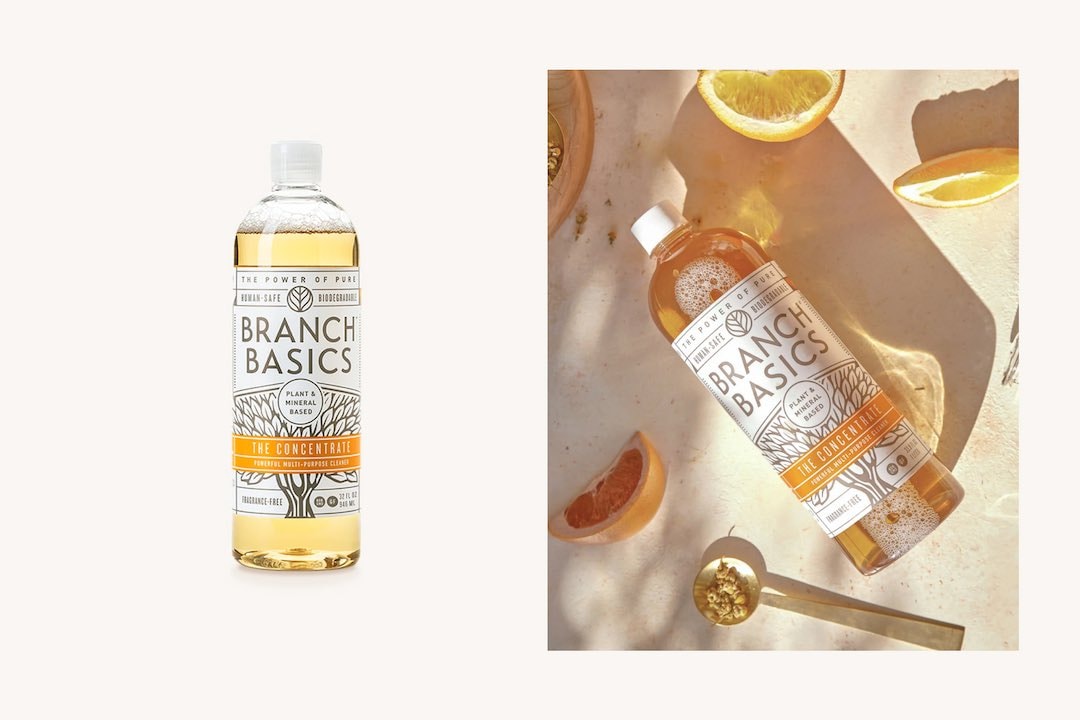
Image @ Branch Basics
What Are the "Better" Best Non Toxic Dish Soaps?
Molly’s Suds Dish Soap*
Liquid
Best for Tough Grease
Pricing: $21.99
Certifications: EWG, Women’s Voices for the Earth, Leaping Bunny
Key Nontoxic Ingredients: Aloe barbadensis leaf juice, Tetrasodium glutamate diacetate
Why We Like It: We didn’t think we could get this excited about dish soap, but Molly’s Suds has totally won us over. The zesty lemon scent instantly perks up our dishwashing routine, and knowing it’s free from all those harsh chemicals makes it even better. Sure, it doesn’t suds up like the old-school stuff, but it still powers through grease and grime like a pro, leaving our dishes spotless. Plus, we’re all about their commitment to reducing waste—thanks to The Refillery, they’ve kept thousands of containers from piling up in landfills. It’s safe for our home and makes us feel good about every wash.
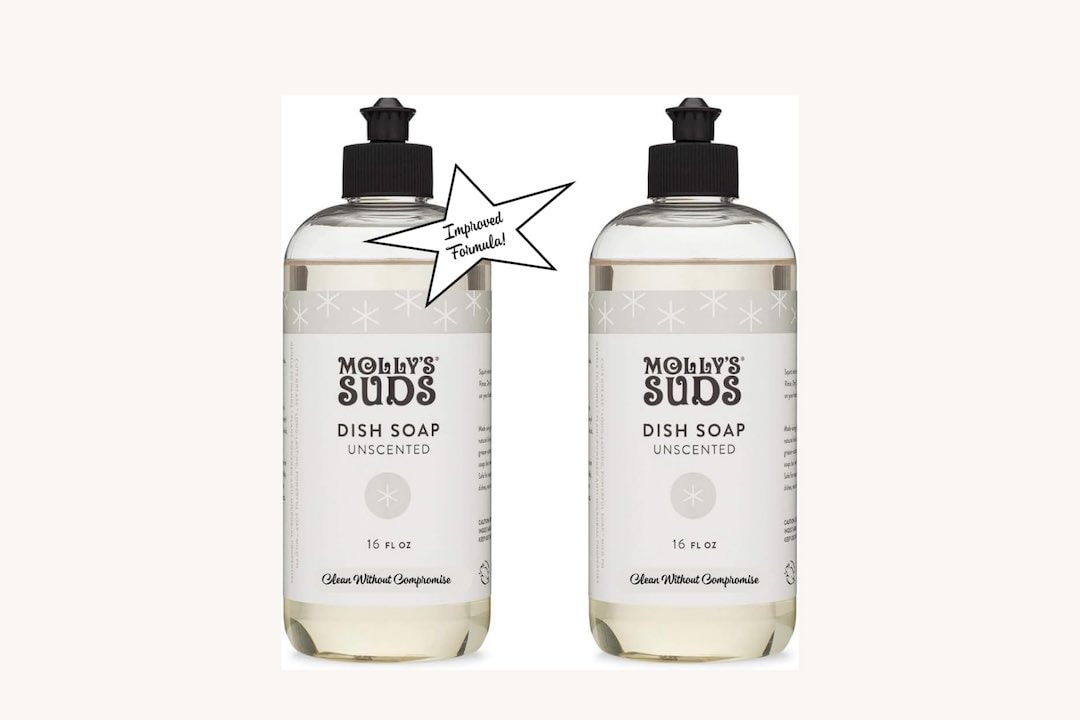
Image @ Molly's Suds
Nellie's One Soap*
Liquid
Best Simple Formula
Pricing: $15.29
Certifications: EWG, Leaping Bunny
Key Non Toxic Ingredients: Alkylpolyglucoside
Why We Like It: Who knew dish soap could be a little slice of magic? Nellie’s One Soap isn’t just another cleaner on the shelf—it’s like discovering the secret sauce to a spotless kitchen. This soap tackles grease and grime effortlessly, all without those harsh chemicals we’re all trying to avoid. The clean, simple formula is not only effective but also gentle on our hands, which is a huge win. Plus, we can’t help but appreciate Nellie’s commitment to transparency and eco-friendly practices—they’ve nailed the balance between clean living and effective cleaning. It’s the trusty sidekick every kitchen needs, making us feel good about every wash.
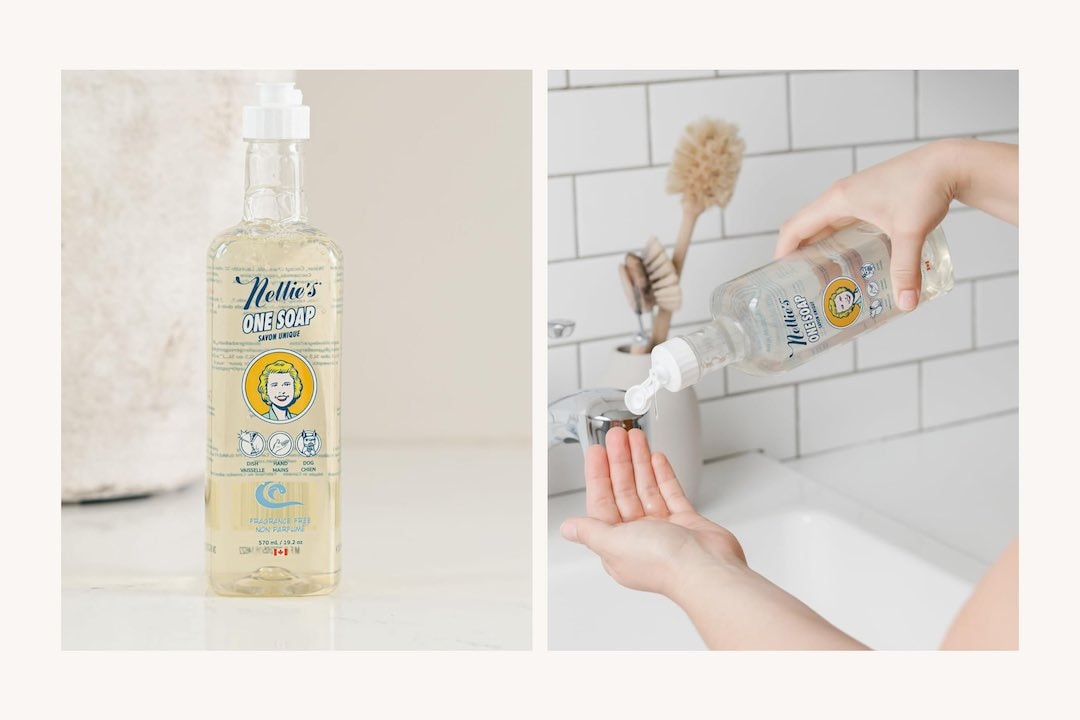
Image @ Nellie's
Public Goods Dish Soap*
Concentrate
Best Budget-Friendly
Pricing: $12.95
Certifications: N/A
Key Non Toxic Ingredients: Sodium coco sulfate, Potassium sorbate, Natural basil oil
Why We Like It: This dish soap is like a breath of fresh air in our kitchen—literally. The soft citrus scent of mandarin and basil is a refreshing change from the typical dish soap smells, making every wash a little more enjoyable. We love how the bottle is perfectly sized, easy to handle even with wet hands, and looks sleek sitting on our counter. But it’s not just about the looks—this soap really delivers, cutting through grease and grime without any of the harsh chemicals we’re steering clear of. Plus, knowing that the bottle is made from 100% recycled plastic and that Public Goods is committed to reforestation and helping those in need makes us feel even better about using it.
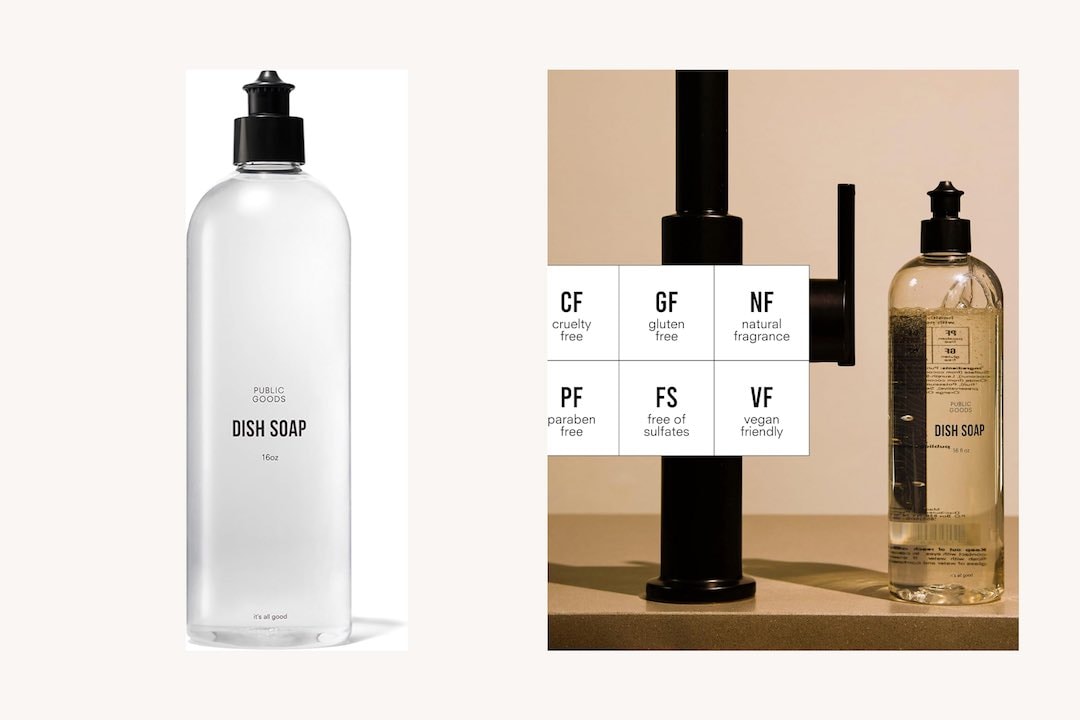
Image @ Public Goods
These are our top picks for non-toxic dish soaps. Whether we need something tough on grease or gentle on our hands, these options have us covered.
And while non toxic soaps are the best options for health and safety, expectations around efficacy are important to mention.
Plus, many brands do a really impressive job of keeping their ingredients list clean and tight, free from toxic stuff, but there's still a lot of deception out there. It's important to equip yourself with the knowledge you need to navigate the unavoidable greenwashing that takes place in this industry.
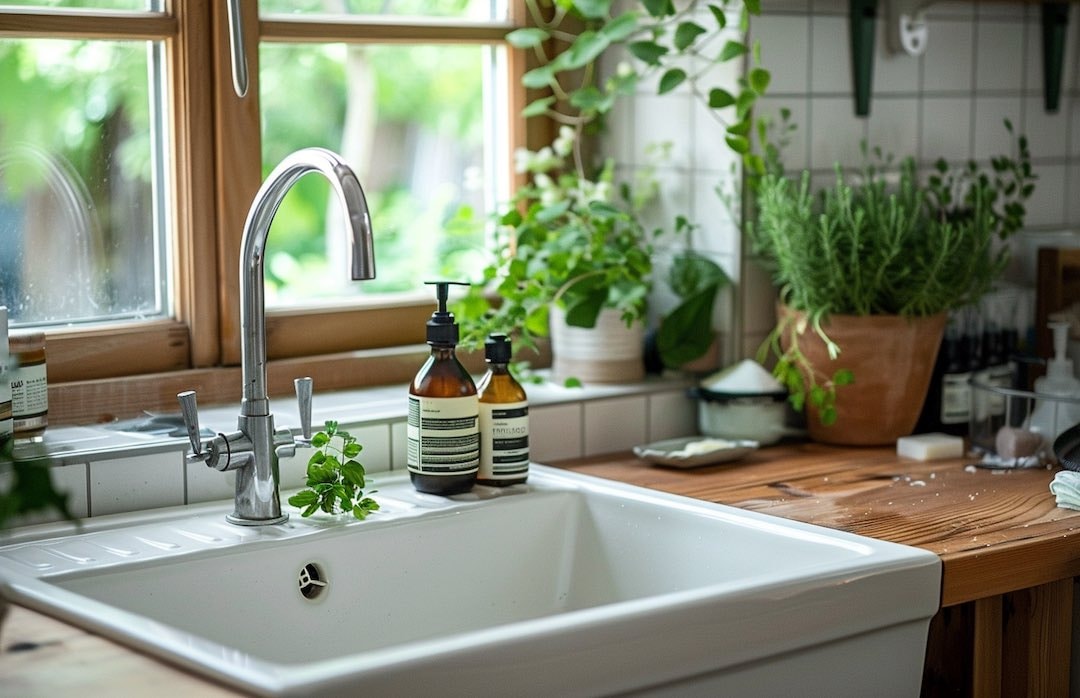
A Note About Non Toxic Dish Soaps
There’s one thing we know for sure: if we use truly non-toxic dish soaps, we are saving ourselves and our families from exposure to some really dangerous chemicals.
But, there’s something we noticed during our testing phase that’s worth mentioning. With many of the gentler, non-toxic options, you might find yourself using a little more product to get that squeaky clean feel.
It’s a small trade-off, but one that’s totally worth it for the peace of mind that comes with knowing you’re using something safe.
Ingredients to Look Out For
When it comes to choosing the best non-toxic dish soap, knowing which ingredients to avoid can make all the difference. Here’s a quick rundown of the common culprits we sniffed out in conventional dish soaps:
-
Sodium Lauryl Sulfate (SLS) and Sodium Laureth Sulfate (SLES): These synthetic surfactants create that rich lather we’re used to, but they can be harsh on the skin, causing irritation and dryness. SLES is also often contaminated with 1,4-dioxane, a potential carcinogen.
-
Phthalates: Often hidden under the term "fragrance," phthalates are used to make scents last longer. They’re known to be endocrine disruptors, meaning they can interfere with hormone function and potentially lead to health issues over time.
-
Triclosan: This antibacterial agent was once popular in many household products but has been linked to hormone disruption and the development of antibiotic-resistant bacteria. It’s also harmful to aquatic ecosystems.
-
Parabens: These preservatives are used to extend shelf life, but they’re also hormone disruptors that can mimic estrogen in the body, potentially leading to reproductive issues and an increased risk of cancer.
-
Synthetic Fragrances: The term "fragrance" on a label can hide a cocktail of chemicals, many of which can trigger allergies, skin irritation, and even respiratory issues. Some synthetic fragrances also contain phthalates.
-
DEA/MEA/TEA (Diethanolamine, Monoethanolamine, Triethanolamine): These chemicals are used as foaming agents and emulsifiers but can react with other ingredients to form nitrosamines, which are carcinogenic. They can also cause skin and eye irritation.
-
Formaldehyde and Formaldehyde-Releasing Preservatives: Often used to prevent bacterial growth, formaldehyde is a known carcinogen and can cause respiratory issues and skin irritation. Look for names like DMDM hydantoin, imidazolidinyl urea, and quaternium-15 on labels.
-
Chlorine: While effective at killing bacteria, chlorine is a harsh chemical that can irritate the skin, eyes, and respiratory system. It’s also harmful to the environment, particularly aquatic life.
-
Artificial Colors: These dyes are used to make products look more appealing, but they offer no cleaning benefits and can cause skin irritation and allergic reactions. Some artificial colors are also linked to more serious health concerns like hyperactivity and cancer.
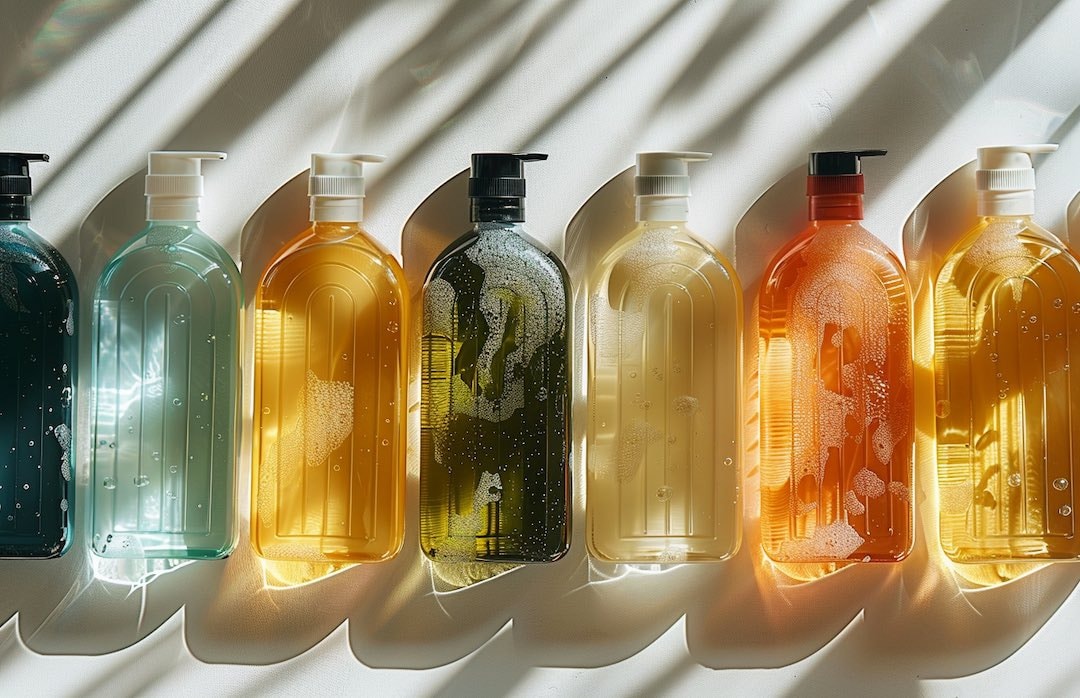
What's the Big Deal?
"But I rinse the soap off my dishes, so it’s fine, right?" Not quite.
Just because the soap gets rinsed away doesn’t mean you’re completely in the clear. For starters, when you’re washing dishes, the soap is in constant contact with your hands, and those harmful ingredients can be absorbed through your skin.
Over time, this exposure adds up, potentially leading to skin irritation, hormonal imbalances, and other health concerns.
And even after you’ve rinsed the dishes, there’s often a residue left behind. You might not see it, but it's there. This residue can bind to the food you eat, meaning those chemicals could end up in your body, where they can cause even more harm.
So, while it might seem like a small thing, the ingredients in your dish soap can have a big impact on your health and well-being. That’s why choosing a truly non-toxic option isn’t just a nice-to-have—it’s a must for a safer, healthier kitchen.
The Greenwashing Ways of the Dish Soap Industry
Here’s the hard truth: not everything that claims to be “natural” or “green” actually is.
The dish soap industry is notorious for greenwashing—using misleading labels and logos to make products seem safer than they really are.
You’ve probably noticed this in the food industry with terms like “natural flavor” on labels, which can hide a wide range of ingredients. The same trick applies to dish soaps, where terms like “fragrance,” “parfum,” or “perfume” are used to mask potentially harmful chemicals.
What makes it even trickier is that companies aren’t required to disclose the actual ingredients that make up these fragrances.
This means that a seemingly simple word like “fragrance” could be hiding a cocktail of chemicals, including phthalates (linked to hormone disruption), parabens (which have been associated with reproductive harm), and synthetic musks(which can accumulate in the body and the environment).
These ingredients are often used to enhance the scent, prolong shelf life, or even just improve the product's texture or appearance, but they come with risks that aren’t immediately obvious from the label.
The bottom line? You can’t rely on pretty packaging or vague claims to ensure you’re buying something safe. It all comes down to reading the ingredient list carefully. If you see broad, non-specific terms like “fragrance,” "perfume," or “parfum,” be cautious. These terms can mask a host of hidden ingredients that could be anything but natural or safe.
By equipping yourself with the right information, you can avoid falling for these greenwashing tactics and choose products that genuinely align with your commitment to a healthier, safer home. It’s not just about what’s in the bottle—it’s about what’s not, too.
Called Out! (Brands that Greenwash)
Finding truly non-toxic products can feel like navigating a minefield. With so many brands using terms like “natural” and “eco-friendly,” it’s easy to be misled.
We just can’t afford to take labels at face value.
That’s why we dig deep into the ingredients before making our choices. Here are some brands that might look green on the outside but don’t quite live up to the hype:
With a name like Clean Cult, you’d expect nothing but purity. However, their dish soap contains Laureth-7, a synthetic surfactant that can be contaminated with 1,4-dioxane, a possible carcinogen. It’s a perfect example of why we don’t just trust the label—we read the fine print.
Despite the promise in its name, Truly Free isn’t free from questionable ingredients. Sodium Benzoate is one of them—a preservative that, under certain conditions, can release benzene, a known carcinogen. This is a prime example of why we always double-check what’s really inside.
Ecover is often marketed as a green alternative, but their dish soap contains Sodium Lauryl Sulfate (SLS). SLS is a powerful surfactant that can strip skin of moisture, causing irritation, and is harmful to aquatic life. It’s a reminder that even “green” brands aren’t always as gentle as they seem.
Method is a favorite for many looking to clean greener, but their dish soaps contain SLS, Methylisothiazolinone (MIT), dyes, fragrance, and Octylisothiazolinone. These ingredients can cause skin irritation and allergic reactions, not to mention their environmental impact. This is why we always look beyond the branding to the ingredient list.
Mrs. Meyers is another brand that’s built a reputation for being natural and gentle. But their dish soaps include SLS, polysorbates, fragrance, MIT, and Benzisothiazolinone (BIT). These are all ingredients we steer clear of because of their potential to irritate skin and harm the environment.
Known for their eco-friendly image, Seventh Generation’s dish soaps contain SLS, MIT, and BIT. While they may market themselves as safer for the planet, these ingredients tell a different story.
The Bottom Line
Navigating the world of “green” products can be tricky, but it’s worth the effort. These examples show just how much research goes into our decision-making process. We’re not just looking for products that claim to be non-toxic; we’re making sure they actually live up to that promise. By being vigilant and informed, we can avoid the pitfalls of greenwashing and choose products that truly support a healthier lifestyle and a safer environment.
Key Takeaways:
-
Conventional dish soaps often contain harmful chemicals like SLS, phthalates, and parabens, which can cause skin irritation and disrupt hormones.
-
Non-toxic dish soaps are made with safe, natural ingredients such as organic oils and plant-based extracts, offering effective cleaning while protecting your health and the environment.
-
Some brands claim to be “natural” or “eco-friendly” but still contain toxic ingredients. Always check the ingredient list to ensure you're choosing a truly non-toxic option.
-
Look for certifications like MadeSafe, EWG Verified, Leaping Bunny, and Ecocert. These labels guarantee that the product has been thoroughly vetted for safety, sustainability, and ethical sourcing, ensuring you're truly getting a non-toxic and eco-friendly dish soap.
-
Switch to non-toxic dish soaps to reduce exposure to harmful chemicals, enjoy a safer kitchen, and support a healthier environment.
If you enjoyed this post, check out this other article on a safe and non toxic products:
FAQs
What is the safest dish soap to use?
The safest dish soaps are those free from harmful chemicals like SLS, phthalates, and synthetic fragrances. Look for products with certifications like MadeSafe, EWG Verified, or Leaping Bunny. Brands like Meliora, Dr. Bronner’s, and Sonett are excellent choices.
Is Dawn non-toxic?
No, Dawn contains SLS and synthetic fragrances, making it less safe compared to non-toxic alternatives.
What is a natural alternative to Dawn dish soap?
Dr. Bronner’s Pure Castile Soap or Meliora’s Dish Soap Puck are excellent natural alternatives to Dawn, made with safe, plant-based ingredients. Check out the other products on this list! They're all great alternatives.
How do you know if dish soap is non toxic?
Check the ingredient list for harmful chemicals like SLS, parabens, and synthetic fragrances. Look for certifications like MadeSafe or EWG Verified to ensure safety.
What ingredients should I avoid in dish soap?
Avoid dish soaps containing Sodium Lauryl Sulfate (SLS), Sodium Laureth Sulfate (SLES), phthalates (often hidden under "fragrance"), parabens, triclosan, DEA/MEA/TEA, formaldehyde-releasing preservatives, chlorine, and artificial colors. These chemicals can cause skin irritation, hormonal disruption, and environmental harm.
*The links are so-called 'affiliate links.' This means if you click on one of these links and make a purchase, we may receive a small commission at no extra cost to you, which in turn helps us to further develop the blog and create even more useful and valuable content for you!
Orbasics Gmbh is also a participant in the Amazon Services LLC Associates Program, an affiliate advertising program designed to provide a means for sites to earn advertising fees by advertising and linking to amazon.com.
2 comments
I washed out my water drinking cup with dawn dish soap and it now smells like chemicals every time I take a drink of water! Thanks for the info.
Thanks for the information about toxic ingredients in cleaning products.













